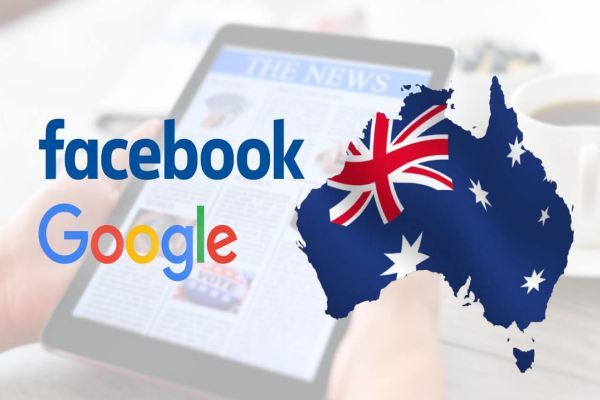Asking Facebook and Google to pay fees, who will be the pricing of the news?
- Tram Ho
In mid-February 2021, Australia decided to price news and Facebook refused to subscribe to news. The Australian House of Representatives then passed a new media law on Feb. 17, aimed at forcing Facebook and Google (and just asking Facebook, Google) to pay media fees to obtain affiliate privileges for newsletters. Google is still negotiating the terms, while Facebook has decided to stop the service and not allow Australian users to post news.

Regarding the dispute between Facebook, Google and the Australian government, some commentators believe that the Australian government’s choice is not to regulate the big technology companies, but to strangle the value of “news that is. Australians are no longer willing to pay ”from foreigners.
The Australian Government has actually set prices for publisher’s ads. It’s just that the law doesn’t require publishers to pay Facebook, but instead requires publishers to pay publishers to “link to publisher’s content”. Understandably, Facebook is not willing to pay for ads on Australian newspapers and television stations.
The press will not be the sole beneficiary of Australia’s New Media Negotiation Rules. This rule also applies to commercial broadcasters, online media and even media providers at two national levels.
Although the fighting papers have always represented Australia’s declaration of war on major technology, many other media organizations have done quite well. At the same time, if there is a problem in the television industry, the challenge facing the industry will not be a drop in advertising revenue, but the rise of subscription-based streaming media services. – another industry that the Australian government wants to regulate.
Big tech companies are in big trouble. The public is demanding political action to regulate the dominant digital platforms, notably Google and Facebook. Privacy activists “smelled the blood”. While average Internet users rarely seem concerned about data leaks, reports of possible identity theft have caused many to worry.
Politicians are holding hearings, and the media are ready to gather to participate, hoping to at least recoup a portion of lost advertising revenue from media companies. Internet giants. The thing is, they are forgetting one aspect, which is who is in charge of pricing news? This is an important premise before entering into valuable negotiations and long-term influence before Facebook, Google.
The place of the incident was not Washington, but the Australian capital, Canberra. The truth is more than just show off in front of the camera. Australia’s top politicians are actively pushing the law, possibly forcing Google and Facebook to pay news organizations, for the news clips they show up in search results and timeline. of the user.
New laws and regulations are being introduced, including those on Netflix, Disney + and even online media platforms like Amazon’s Prime Video, with mandatory local content rules. Australia became the starting point in an increasingly powerful counterattack against all-round digital giants. How far will lawmakers go, how will Internet companies counterattack, and will Washington protect Internet companies as they did in the past?
How the administration of US President Joe Biden will react to an important foreign ally, keeping in mind domestic support is an open question. Silicon Valley executives are among the Biden campaign’s biggest contributors, arguably these companies created an atmosphere of opposition to former President Donald Trump on social media.
Biden’s transformation team is made up of mid-tier Internet executives; Taking history as a lesson, they are able to seek the interests of the industry both at home and abroad – pressure on domestic management is increasing, especially from the US Congress. Even the Trump administration openly supports Google and Facebook; it is hard to imagine that the Biden administration will refuse to help them.
Not the biggest tech companies need Biden’s help. Google has threatened that if Australia continues to implement the terms of the plan, it will close the news or even the entire search engine. Australian lawmakers call this “bullying” and “blackmail,” while Prime Minister Scott Morrison said, “We will not respond to threats.”
In a truly free news marketplace, media organizations will pay Google and Facebook to recommend their content, just as advertisers buy top positions in search results. Even the big tech companies are not afraid to take full advantage of their advantages in this area.
They tend to adopt security strategies to increase the rankings of long-standing news organizations with free political connections and lobbying, while blocking out inappropriate news. Google and Facebook have made a lot of money in the search business, but they’ve lost a lot in the news business. Its economic value lies in maintaining user engagement on the platform, rather than selling ads.
We are used to some tightly regulated national Internet policies and there is reason to believe that the EU is slowly evolving in a similar direction. In contrast, President Biden has never given up on any opportunity to emphasize how he will work with allies to solve the world’s biggest problems, but he is unlikely to work with co-workers. to take down big tech companies.
A series of antitrust actions against Google, Facebook of various states and the US have all focused on anti-competitive behavior, rather than on national protectionism. Biden’s Justice Department may force Google to open its advertising platform, but will not attempt to regulate Google’s search algorithms.
While Congress has always wanted to condemn Facebook’s so-called stereotypes, it won’t order the company’s CEO Mark Zuckerberg to start paying fees for news. Therefore, the necessary condition for Google and Facebook to be willing to sit at the negotiating table is that the government and the media need to agree on a reasonable pricing plan for news sources in the future.
Source : Genk
